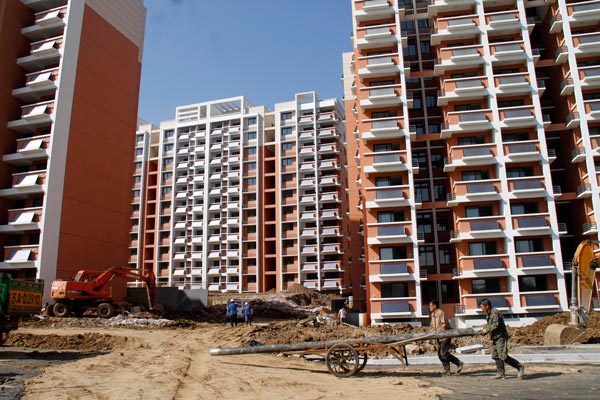 |
|
A property construction site in Nanjing, capital of Jiangsu province. [Photo/China Daily] |
The reform seeks to replace sales tax with value-added tax or VAT - that is, tax on output minus tax on input - thus removing duplication of taxes and easing financial burden on enterprises.
Under the new system, companies no longer need to pay sales tax based on their revenue.
Tax burden would be eased to the extent of 600 billion yuan ($91.26 billion) this year, said taxation expert Hu Yijian, a professor of finance and economics at Shanghai University.
Premier Li Keqiang said in a recent meeting that a pilot program involving VAT in place of business tax has been running effectively.
The program will include more sectors this year, Xinhua News Agency reported.
Analysts said sectors where input taxes are high, including construction, real estate and consumer services, will benefit the most.
A report from GF Securities Co Ltd said land is a large part of property developers' costs and impacts on input tax. But, under the new system, profit margin may widen greatly if the land cost is regarded as part of input tax.
Even for developers with deductible taxes on other cost items such as decoration and installation projects, profit margin may widen after the reform, the report said.
Zhu Weiqun, an expert on fiscal systems at Shanghai Finance and Economics University, said tax burden on establishments that provide consumer services, such as restaurants, hotels, entertainment centers and tourism destinations, will be reduced greatly after the reform.
Current sales tax on these enterprises is about 5 percent of their revenue. After the reform, it is estimated that the VAT will be 6 percent for general taxpayers in this sector, and 3 percent for small-scale taxpayers, according to Zhu.
"Although general taxpayers' anticipated VAT at 6 percent is higher than the current sales tax of 5 percent, the actual tax paid may not be higher after deduction of input tax," said Zhu.
For providers of financial services, such as banks and brokerages, the impact of the fiscal reform may not be immediate because deduction of input items needs to be further clarified, and consultation among the parties concerned is required to define deductible input items.
A report from Beijing Gao Hua Securities said the impact of the fiscal reform on domestic banks and brokerages may be mild and manageable in the short term.
Based on the analysis of their financial performance in 2014, banks' and brokerages' profits before tax are estimated to narrow between 0.5 percent and 1.7 percent as a large part of their current sales revenue is not regarded a deductible input item.
However, in the longer term, players whose personal operating expenses are higher than peers, may benefit more from the reform as these costs may be defined as deductible items.
A research note by PwC China said that detailed rules for the fiscal reforms covering four more sectors are likely to be introduced by March-end, and may take effect by the end of this year.
wuyiyao@chinadaily.com.cn
